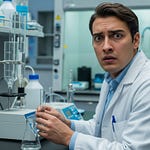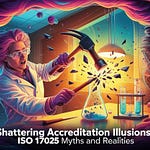In this episode, Dr. Steven Rauchman, a board-certified ophthalmologist with over 40 years of experience, discusses the reliability of horizontal gaze nystagmus (HGN) tests used in DWI cases.
He explains how the HGN roadside test can produce false positives and how various medical conditions, not just alcohol, can cause the eye movements that officers interpret as intoxication.
Dr. Rauchman shares his background in clinical ophthalmology and med-legal work, his journey into investigating HGN tests, and the critical flaws within the current testing system.
Clips
Chapters
00:00 Introduction to Dr. Steven Rauchman
00:36 Dr. Rauchman's Background and Experience
01:41 Interest in Nystagmus and Eyewitness Testimony
03:42 Critique of Horizontal Gaze Nystagmus Tests
05:49 Challenges in the Legal System
09:33 Scientific and Medical Concerns
20:14 Potential Solutions and Compromises
27:18 Conclusion and Contact Information
Related podcasts
Challenging the Validity of SFSTs and Drug Recognition Testing with David Rosenbloom
Are Standardized Field Sobriety Tests (SFSTs) Scientific? - Josh Ott
Field Sobriety Testing and Drug Recognition: A Conversation with Noah Pesola
Automated transcript (not checked for errors)
Introduction to Dr. Steven Rauchman
Aaron Olson: Today I'm joined by Dr. Steven Rauchman, a board certified ophthalmologist with over 40 years of experience who specializes in challenging the reliability of horizontal gaze nystagmus tests in DWI cases. He's both a eye surgeon and a respected medical legal expert. Dr. Rauchman will explain why these roadside tests may produce false positives and how various medical conditions, not just alcohol, can cause the eye movements that officers are trained to interpret as intoxication. Dr. Rauchman, thanks for being part of the show.
Dr. Steven Rauchman: Oh, it's my pleasure. Thank you very much for inviting me.
Dr. Rauchman's Background and Experience
Aaron Olson: So tell me a little bit more about yourself. What is your background and experience and how does it relate to, uh, horizontal Gaze nystagmus tests?
Dr. Steven Rauchman: Well, my background is a clinical ophthalmologist. I was in a private practice in a suburb of Los Angeles for like 32, 33 years doing comprehensive ophthalmology.
Um, I. I was also on the trauma panel of a, of a high level trauma center, Providence, holy Cross Medical Center, where I saw a lot of trauma cases. And um, so I've seen, you know, thousands of patients. So my clinical experience is extensive. And then about 15 years ago, I started doing med-legal stuff, mostly in the area of, uh, personal injury cases.
My academic focus has been on, uh, visual manifestations of traumatic brain injury where I am, uh, well published and considered an important expert on vi visual manifestations of traumatic brain injury, which is kind of an underserved area.
Interest in Nystagmus and Eyewitness Testimony
Dr. Steven Rauchman: Um, in general, um, my interest in nystagmus actually came about circuitously.
I was. I am was very interested. I became interested, um, in a case, a criminal case in Indiana where there was, uh, vision issues that were unrelated to any kind of civil, um, issue. And then I became interested in eyewitness testimony from a ophthalmologic standpoint and realized there was an absolute absence of literature.
On any ophthalmologist, opining on how a person at a given distance and given lighting could identify, uh, a potential, you know, suspect in a case at a distance where eyewitness testimony is obviously critical in criminal cases. So I wrote a paper on the subject and it was published in the Journal Champions, which is, um, uh, a journal and I wrote it with some other, um, defense attorneys.
And, uh, on the, the issue of eyewitness testimony is published in the November, December issue of Champions, which is a, a well-known defense journal. And I've attended some meetings, um, at, at these kind of conferences related to defense, criminal defense. And then I kind of like became interested in nystagmus because I also realized that, um, gaze evoke nystagmus is part of the field sobriety test.
And I thought that was just odd. And I, and I'd seen it of course, on TV and in movies where police officers go through the, uh, the routine of, of having the patient's eyes move left, right. And then they make some type of determination. But I never really connected it to what I did. I, I just thought it was kind of interesting.
Critique of Horizontal Gaze Nystagmus Tests
Dr. Steven Rauchman: And then when I delved into that area, I realized that there was no scientific foundation for a police officer to do this test. And I found that disturbing. And I went through the literature and I went through what's been published and what the government, um, supports as, um. And I realized that the, the reason no one had really questioned this is because no ophthalmologist was really interested in this topic because it's not what, it's not what we do.
We do surgery and we see patients. We don't venture into the far reaches of, uh, a legal world where we're really not comfortable and where our opinion opinions generally aren't wanted. But then I realized. Yeah, but this isn't right. I mean, you can't just leave false science standing. And I, and I understand the importance of getting people off the road who are drunk.
I mean, we all understand that, but I, I was mystified as to why no other ophthalmologists or very few had come forward and said a police officer can't test for nystagmus. Nystagmus is not an easy thing to evaluate. And I spent my whole career. Checking patients for nystagmus. So it's not like I'm, I'm a newbie to this field.
I just never did it on people at the roadside who were being pulled over for possible intoxication. Does that help? Yeah.
Aaron Olson: Yeah. Yeah. That's, that's fascinating. So, yeah, you know, you. But there's a lot to unpack there. But what I found interesting is that you saw that there was this injustice, this and this really false science that the more you dig into it, the more you realize just how bad and the paucity of literature and research that really supports it.
There is, it's just built on a house of cards and it, but. Unlike others, you, you didn't turn a blind eye. You, you kept digging and you kept looking into it.
Challenges in the Legal System
Aaron Olson: Um, what keeps you looking into it? What, what, do you have a, you have an interest in general in, in helping people who are in difficult situations?
I mean, what, what brings you back to it?
Dr. Steven Rauchman: I think that's a great question and, and I wonder about that sometimes myself, because. Uh, most of us behave in a, in a way that, you know, financial incentives are what drives most ophthalmologists. So if I do premium cataract surgery, for example, and I get paid to put in a multifocal lens, I can get paid three to $5,000, um, on top of Medicare by a, a private patient, and it would take me 15 minutes to do that procedure.
And I was. Well versed in cataract surgery. So most ophthalmologists, like most professionals these days are interested in what makes, I mean, I hope, I'm not being cynical here, but what makes money, um, and, and, and so I, I don't, I don't think people are generally interested in things that have some sort of social relevance in independent of them.
Finding it as an avenue to immediately recoup some type of income. That, that, that's my experience. That, that hasn't always been my experience. I mean, I, I grew up in an era of the sixties and seventies where there, there was a little more idealism. And the other thing is I'm an intellectually curious person, and this is kind of an intellectually curious problem to me.
And, and then I, I mean, I have read the Constitution and, and there is. I think a clause in there are about probable cause that says that you can't do, um, you can't just do blood alcohol analysis on somebody unless you have a reason to believe that there's probably something wrong. And, and that seems like a pretty important constitutional right to me.
Um, and the government. Doesn't seem to think that they, they need to do that in this case. Um, now I understand if somebody is staggering around and is swerving, has alcohol in their breath, there's probable cause to do testing, but gaze nystagmus is not probable cause and that's the most objective. Of the measures used in the field sobriety tests, and in fact, I've written a paper and I've submitted it for publication, it has not been published yet, which details my opinion with references on all the flaws that are involved in having a police officer do an an, an evaluation for gaze evoked Nystagmus.
And I'm happy to discuss those in detail. But my interest. It's the same as my interest kind of in, uh, criminal law in eyewitness testimony. Again, there's really no reason for me to be interested in how people can see, um, criminals at a distance that's sort of a, a one-off and in fact the whole area of visual manifestations of traumatic brain injury.
No, ophthalmologists are interested. They're interested in intrinsic eye pathology. They're not interested in people who got head injuries. Who are having visual problems that, that those are not considered patients that are worthy of further investigation. So yeah, I think I'm for the underdog. Maybe.
Maybe that's it.
Aaron Olson: Well, tell me a little bit more about what you found.
Scientific and Medical Concerns
Aaron Olson: You know, you, you basically, you're very curious, you looked into it. You, you realized that there really wasn't any science behind it, or very little, but yet on the one hand you've got the government, uh. The National Highway Traffic Safety Administration saying this is highly accurate, this is a highly accurate indicator of impairment, and having a blood alcohol above 0.08.
And on the other hand, you look at the scientific literature and their, and even their, their own studies and their, if you look, if you dig into the details, their own studies don't support their conclusions. Um, tell me about some of the biggest problems that you see, uh, with officers doing HGN at the roadside.
Dr. Steven Rauchman: Well, let's just start with what you just said. Uh, police officers doing HGN at the roadside. Okay. So from my understanding, a police officer has to go through, I dunno, fairly exhaustive training and there's different levels of expertise that they can get different certifications, but let's say they spend 30 hours learning how to evaluate for nystagmus.
Okay. I'm an ophthalmologist. I spent eight to 10 years in medical training to get my ability. Okay. Would you want a police officer who'd spend 30 hours learning how to do cataract surgery? To do cataract surgery? Would you want me to be in a living room where there's a domestic violence dispute trying to separate?
You know, warring partners, you know, to solve that problem. The an the answer is no. No. Now police officers, I believe, are well intended and, and their desire is to do the best they can. But nystagmus is a difficult finding and it's an ophthalmologic finding. And we don't ask police officers to make other diagnosis.
We don't ask them to read EK ECGs. We don't ask them. We, we. We delegate that to the profession where it belongs. So I think that just the presumption that a police officer can have another police officer teach them nystagmus like in a little, you know, lesson plan is, is an, it's an inherently flawed assumption.
You, you just don't learn details of an ophthalmologic exam. that way And the only conclusion one can draw is they've already made the decision that, that they want the police officer to test for this, and then they throw a certification to sort of, it's like putting, you know, gilding the lily, the lilies without foundation.
They put a little crown on it and said, well, you have the certification. What I'm saying is I'm sorry, as an ophthalmologist, you, you don't, you, you can't evaluate for nystagmus. It's not a flaw in you as a human being. It just means you can't do it. Uh, and I can, and I have the years of training to demonstrate it.
So the government was obviously trying to create a pretext for probable cause when they instituted this because they knew they had a little problem. They had a problem, they couldn't just. Immediately pull somebody over for a moving violation and go straight to an alcohol. 'cause then, uh, an attorney might argue you had no probable cause because my client was just speeding.
And, and the question I posed in my paper is this, if you just took every person you pulled over for a moving violation and did a blood alcohol concentration test on them, or a breathalyzer test, what percentage would come up positive? And if a lot of people out there are drinking and driving, you may, we may be surprised that a lot of them would've tested positive, but that doesn't mean that your, your field sobriety test was of any value scientifically.
You would have to prove that that field sobriety test significantly improved your accuracy. 'cause if all you've shown is that you get a lot of positive blood, alcohol, or breathalyzer tests on people who are driving poorly. Then, then you, you, you bypass probable cause and then, and then I don't think everybody being pulled over for a moving violation gets tested for blood alcohol and I don't think the courts or the public would want that.
So, so we go, we tippy toe through this field sobriety test to create the illusion that we're doing something scientifically valid. So then in front of a jury, it'll look like we did due diligence, but, but the problem is, is you need to, it needs to be based on a scientific foundation. You can't just have a 50 year fantasy continue to exist.
We're in the 21st century. We need to put this to rest. That, that's my feeling. And I do not wanna see people drinking and driving and killing people on the road. That's the last thing. I'm interested in advocating for, I think there needs to be strict enforcement and there's way too many drunk drivers out there, so this is a very narrow issue I'm interested in.
I just don't like my test nystagmus being used for an unfounded purpose.
Aaron Olson: Yes, yes. You know, it, it's interesting, um, you, you, you brought up a lot of the issues with it, but. Even in their own publications. For example, if you look at, uh, Marceline Burns Publications, robustness of the HGN, and in that paper, the raw data shows that about 50% of the people who are below 0.08 in that paper.
Gave positive, they failed the HGN test, meaning they had four or more clues on the HGN test. Um, is that surprising to you as an ophthalmologist that officers found, you know, that half pe half of the sober people failed this test?
Dr. Steven Rauchman: Well, I, I am a little surprised, but, but it, it, and now alcohol does, I mean, if you give enough alcohol, you will.
And most people get illicit gaze evoked nystagmus. So alcohol causes gaze evoked nystagmus, but that, let's put that in a box and separate it from the whole logical flow of the argument. If a person tests below the legal limit for alcohol but has gaze evoked nystagmus, the question then becomes, is there any relationship between that?
Trace amount of alcohol and the gaze evoked nystagmus. So as a physician, and this is why this is so important, the first question would come to me, is there some other cause of this gaze evoked nystagmus that we've now documented? Because gaze evoked nystagmus is not always a normal finding in an eye exam.
So the first question you would act as a physician is. What's going on? Why does this person have gaze evoked nystagmus? And the first thing you would do is obviously then do a comprehensive eye exam. Do a comprehensive medical history to see if there's other drugs, if there's been a history of head injury.
If there's something else going on with this person, which falls way beyond the ability of a police officer. The other thing you would do is you might test it a second time to see if it's a consistent finding. So let's say you think, well, maybe it's from the alcohol. Then I would do as a physician is go, why don't you come back the next day or a week later and we'll see if the nystagmus is still there.
And if the nystagmus is gone, you'd say Maybe it's from a small amount of alcohol. If the nystagmus. Still present and there's presumably no alcohol. Then you're going, I now have a new neurologic finding. You don't send the patient home saying You're fine. Hunky dory. They may have underlying pathology. So, so the police inherently, if, if they release these people that have, don't meet the criteria for A DUI, but have nystagmus.
They're committing malpractice and they're not even really committing malpractice 'cause they're not doctors, but. This system is committing malpractice 'cause you now identified something that's abnormal and you don't know if some of these patients have underlying neurologic diseases or intracranial pathology.
'cause what I would get in patients that had pronounced gazo nystagmus, my first test would be an MRI of their brain because I want to make sure I'm not missing anything. And then if their mind of the brain is negative, that's somewhat reassuring. These people are being sent home and they're, they're happy.
They just have their ticket and no DUI, but. They don't know if anything's going wrong with them. Uh, it's, it's a wrong headed approach based on logic. Also, if you can get nystagmus from subclinical amounts of alcohol that undercuts the whole thing. I mean, it, it means that, it means that this is a fairly common phenomena probably that exists in a lot of normal people.
If and if you're sampling a normal population and you get 20 to 30% of that normal population, which I do document in my paper and this has been done, which, which which can elicit gaze evoke nystagmus, then you now captured 20 to 30% of people getting what? Four outta six at least, or six outta six gaze evoked nystagmus who are normals com.
Completely normal and maybe they have. Some kind of problem, or maybe we don't know why they have nystagmus. That's a lot of cases, they're not having any visual complaints and their MRI is normal. Then you'd probably say, we'll see you again in a year, and you may never find out why, why they have nystagmus.
But if your normal population has a reasonably high incidence, I. Of a finding, it cannot be used scientifically to distinguish between the ones that now are gonna be arrested and for the ones that are gonna be left alone. That that is flawed thinking.
Aaron Olson: Yeah. . Um, what is to be done? Where do you, where do you go from here and how do you attack this?
What's your, what's your take?
Potential Solutions and Compromises
Dr. Steven Rauchman: Well, first of all, that's a great, what you're asking now is a central question because the reality is that you and I are talking and it's nice, you know, it's, it's nice that we're having an intelligent conversation, but the question is, where will it go from here? And now I've been approached by defense attorneys and I've tried to promote myself the best I can as an expert on this field, but I have not.
Been allowed to even testify in court on this issue. I was supposed to testify in a case in Salinas, and the judge, the judge denied my expertise, and this does not surprise me. The, the, the, the government in the judicial system. Do not wanna see me on their radar screen. They, they, theyre, they really don't, because I'm a really nice guy.
I actually am very empathetic with the hard work police do. And I can quietly and calmly explain to a jury that they are doing the best they can. But this is not a good test, and that might be compelling to a juror. And might convince them that, hey, maybe Dr. Rauch is right. Maybe we need to take a second look.
But that would change the entire, it change the entire system that our whole DUI, the presumption is the public and our politicians and the government wants to put these careless drunk drivers. Off the road. And, and, and they think that pretty much they have a, a pretty straightforward mechanism for getting that done.
And what I'm telling them is choose another path which doesn't involve one of my tests because you've chosen the wrong test, um, and your evidence is weak. Now, I've even discussed with the. And I've been sent this with defense attorneys and DUI cases. I said, let me take, let me take a look at that body cam because a lot of times the quality of the body cam is pretty good and sometimes it's, it cuts off the head 'cause it's something's at the chest.
But I believe the police are instructed to, to mount it on their forehead for doing the gaze evoked nystagmus test, which doesn't seem burdensome. Or pointing it at the camera up so it captures them doing the test. So I think a good compromise solution, which might satisfy the government, is to then have somebody like me then review their, the, the manner in which they conduct and the visual result of the gaze evoked Nystagmus test.
And I, if I don't see nystagmus. That would be pretty compelling in, in my, from me and I, and I think that that would be a nice compromise. I still don't think it's sufficient, but I'm trying to find middle ground with with people, and I've learned, unless you find middle ground, you're very unlikely to move the ball forward at all because you're gonna be shut down.
And trust me, one of my worries is. The government won't like me and you know, my medical license will disappear. You know, I, I am a little anxious about making these kind of statements. Um, I'm, 'cause I, I kind of like having my medical license and I still do stuff with it. And I'm actually trying to help the government in a, in a lot of ways.
'cause, um, I would offer them this as a potential compromise solution. So then I don't seem like. The unreasonable guy, you know, I'm saying, well just, just give me the take like we do for everything. Now, let, let me look at it. Now, if the person has craz nystagmus, maybe the government wins some of those cases, but I, but I have a feeling that a lot of 'em are way too subtle and the, the resolution's good enough on a lot of body cams now, and I've seen some where.
There isn't any there, there is no nystagmus that, that, that the police, you know, they give them the four outta six because that's, that's what they, that's what they're trained to do. Um, and um, I get it. I'm, you know, that's, that's life. But we have to find some middle ground, you know, and I'm not ideologically tied to just, the other thing is if I get to testify, let's say in a few cases, from what I understand from legal precedent.
If that testimony then will be viewed by other attorneys and they're gonna go, wow, that's pretty powerful stuff. And he was cross examined by a good district attorney and he, his testimony seems pretty strong. So maybe I'll u maybe I'll use them on a case. Now, a lot of people can't afford an expert. DUI and in most cases don't involve nystagmus, but there's enough that do.
And so I, I wouldn't mind testifying in court. Um, and, and I'm trying to write a paper and I wouldn't mind talking to the, whoever it is, you know, government district attorney and saying, is there a middle ground that we could all. Except and, and think that would be fair to the government and fair to defense attorneys.
So that's the position I take because I don't wanna be the advocate who comes down hard because that person doesn't get things done. The compromiser gets things done.
Aaron Olson: Yeah, I can see your take. I think that seems rational to a certain extent. But, but on the other hand, I mean, you could go back to the days of, uh, you know, witch hunts and they'd, and you could say, well, let's compromise this little mole freckle over here.
Maybe that, that does mean she's a witch. If it's a certain size. I think some of these tests are almost comparable to witch hunts where you're looking for certain signs that really have nothing to do. I. Impairment and you're trying to use them, you know, because like you said, you, you, you need probable cause.
I, I feel like there needs to be some other test, especially with modern technology and all the different apps we have on our smartphones. Uh, you know, some objective way to determine it other than just, you know, follow my finger, not the logic of the science.
Conclusion and Contact Information
Aaron Olson: But, you know, uh, we're coming up on the end of our time here.
I've gotta get going. Okay. Sure. Uh, maybe, maybe we could do a part two. Um. Where can people get in contact with you if they wanna follow up with you and hear more?
Dr. Steven Rauchman: Oh, I can give you my email and I can give you a cell phone number. That would be the easiest thing to do, and I agree with you. My compromise position is really that I actually deep inside think that you are correct.
The whole system needs to be dropped. I'm afraid to say that I. To be honest with you. Yeah. In all honesty, I believe we need to start over, but, but I'm trying to appear as a reasonable guy 'cause I'm not really an advocate if, if you know what I mean. My, my email is DR dr. Do rauch man, R-A-U-C-H-M-A-N, at yahoo.com.
So that's DR dot R-A-U-C-H-M. At yahoo.com, my phone number is eight one eight six two zero zero one one five eight one eight six two zero zero one one five. I will actually directly pick up that phone, so if there's an attorney who wants to reach me, you're not gonna have a hard time reaching me, and I'm very interested in this topic.
Aaron Olson: Thank you so much for making the time today.
Dr. Steven Rauchman: Okay, have have a good afternoon.











